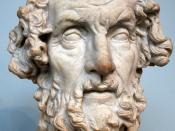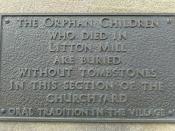2 1/2 page research report. Very good.
The Homeric Poems: Oral or Written Tradition
Homer. A name synonomous with Greek literature and poetry. Some call him the most famous and greatest poet of the Greek society. Known for his 'masterpieces' of western literature the Iliad and the Odyssey, Homer's poems have been passed down through generations and studied by many. But how did the translations, if they are, infact, the true Homeric poems, get to where they are today? Dating as far back as 1120 B.c., the poems may have gone through a dramatic number of changes from their original form. Probably the most important factor in all of this is how they were passed down through the centuries. Scholars of today disagree on the question of whether the Homeric poems were passed down through an oral or written tradition.
In order to mover further into the subject, one must have an understanding of what an oral tradition is opposed to a written tradition.
An oral tradition is one of which we know from our remembered knowledge (Kirdk 199). In this case, the telling of the poem from one generation to the next orally would be an oral tradition. A written tradition is one in which knowledge is recorded in some way shape or form of writing, and passed down that way.
Many citizens of early Greek culture possessed very limited literacy. Even at the peak of Greek society, the ability to read and write was far fom universal, and the uses made of that ability, by many who possessed it, were circumscribed (Kirk 1). Most slaves were illiterate, but so were many free-born citizens. Although there were those who could read and write, their ability to understand in-depth material was limited. Thus many had to rely on oral...


